
Guests
- Ellen Johnson-Sirleaf“The administration must endeavour to give Liberian women prominence in all affairs of our country. We will empower all Liberian women in all aspects of our national life. We will support and increase the weight of law… and deal drastically with crimes that dehumanize. We will enforce without fear of failure the laws against rape easily passed by the national assembly. We will encourage all families to educate all children especially the girls.”
- Emira WoodsCo-director of Foreign Policy In Focus at the Institute for Policy Studies in Washington, D.C. She is originally from Liberia.
Days after the Daily Mirror cited the memo that allegedly reveals President Bush told Tony Blair in April 2004 of his desire to bomb Al Jazeera, Wadah Khanfar, Managing Director of Al Jazeera, arrived in London to petition for a meeting with Blair to discuss the leaked memo. We speak with Khanfar about his demands for more information about the secret memo. [includes rush transcript]
He then published an article in the Guardian newspaper called “Why did you want to Bomb me Mr. Bush and Mr. Blair?” In it he writes, “If it is true that Bush had indeed thought of bombing the Al Jazeera headquarters in Doha, this will undoubtedly constitute a watershed in the relationship between government authorities and the free media.”
- Wadah Khanfar, Managing Director of Al Jazeera.
Transcript
AMY GOODMAN: We continue to look at the Downing Street memo that allegedly reveals President Bush told British Prime Minister Tony Blair in April 2004 of his desire to bomb Al Jazeera. We are joined in the studios here in Doha at the headquarters of Al Jazeera by the Wadah Khanfar, the Managing Director of Al Jazeera. Days after the British newspaper, the Daily Mirror, cited the memo, he arrived in London to petition for a meeting with Prime Minister Blair to discuss the leaked memo. Mr. Khanfar, then published an article in the Guardian newspaper called, “Why Did You Want to Bomb Me, Mr. Bush and Mr. Blair?” in it he writes, quote, “If it’s true that Bush had indeed thought of bombing the Al Jazeera headquarters in Doha, this will undoubtedly constitute a watershed in the relationship between government authorities and the free media.” Wadah Khanfar, the Managing Director of Al Jazeera, joins us here in the studios at Al Jazeera. Welcome to Democracy Now!
WADAH KHANFAR: Thank you very much.
AMY GOODMAN: It’s good to have you with us. Well, can you talk about — at this point, what do you understand? Is this memo real?
WADAH KHANFAR: At this point, actually, we still, supposedly, we have to receive official response from 10 Downing Street, after we have submitted application according to the Freedom of Information Act. However, those who have read the memo confirmed to us that the memo is real. There are ten statements. Ten in that memo speak about Al Jazeera, in particular, and mention that Mr. Tony Blair and George Bush had a discussion about Al Jazeera and the issue of bombing Al Jazeera. We did ask both governments, actually, to give us, you know, a straightforward explanation of what has happened, to confirm or at least to give us the context of that discussion. However, we received many statements, but none of them definitely gave us a certain answer.
So, therefore this kind of atmosphere that has been created around this memo already, you know, was received, is still received by the Arab world and by our organs as another incident, another example of the relationship between the West, unfortunately, and the Arab world. This Al Jazeera has been celebrated by the American administration as the voice for freedom and democracy up to 2001, and after 2001, two of our bureaus were bombed, one in Baghdad and one in Kabul, and then this memo came, to speak about something much more dangerous, which is bombing even the headquarters.
AMY GOODMAN: Before 2001, who said that Al Jazeera is a symbol of freedom, in the Bush Administration?
WADAH KHANFAR: Many spokespeople in the American administration, ministers and officials, did repeatedly take Al Jazeera as an example of freedom of expression, and they did speak about it as a freedom of expression, as a model of freedom of expression in the region, but unfortunately, the same slogan that Al Jazeera adopted, the same motto —-“the opinion and the other opinion” -— we tried, you know, innocently, as journalists, to adopt the same criteria after 2001, and to carry on reporting, but it seems that “the opinion or the other opinion,” when some authorities are representing the other opinion, they don’t want actually to adopt the same criteria. And therefore, we were classified, we were accused, we were even sometimes bombed, and we definitely think that was not the appropriate way that the American administration should have dealt with Al Jazeera during the last few years.
AMY GOODMAN: Talking about the time of this alleged memo, mid-April 2004, this was at the siege of Fallujah. At the time, the U.S. Defense Secretary, Donald Rumsfeld, called Al Jazeera’s reporting “vicious, inaccurate and inexcusable. It’s disgraceful what the station is doing.” The senior military spokesperson, Mark Kimmitt, that’s U.S. military spokesperson, declared, “The stations that are showing Americans intentionally killing women and children are not legitimate news sources. That is propaganda. That is lies.” This was at the period that George Bush allegedly made this statement. Can you talk about Fallujah, the pressure on Al Jazeera at that time, and what you were doing there?
WADAH KHANFAR: You know, I would say that I was at that moment in time, the bureau chief in Baghdad. So I was aware of the daily problems that we faced in our work in Iraq. More than 20 of our colleagues were detained at certain checkpoints. Some of them spent, you know, days in jail, actually, in very serious circumstances. Some of them were tortured in Baghdad. The situation in Fallujah, we — it happened that we were the only team, the only crew, that we had — Al Jazeera had the only crew inside Fallujah reporting live, actually. I remember when Kimmitt made this kind of statement, he was in the box on our screen, the other half of the screen, the other box, was showing live images from the hospital of Fallujah, about civilians who had been killed. He was telling us that, “You are fabricating the story. You are lying. You are not telling the truth,” you know, and the Arab world was watching what has been happening.
Now, of course, recently, a lot of media started to apologize about the misinformation regarding Fallujah and the fact that they were reporting incidents, or the attack on Fallujah from the embedded — embedded with the American side. So the situation in Fallujah, that was the issue. For me as a journalist, when I am reporting from wherever I am reporting from, I am relating the reality as I see it, and the Americans, at that moment of time, were not happy to listen to someone who is saying that there are civilians who have been killed, and by the way, then, they acknowledged that civilians were killed in Fallujah. That does not mean, you know, the fact that they don’t like to see that on the screen, doesn’t mean that me as a journalist should take these sensitivities and political considerations into account, because I have a duty towards the people.
Some of our audience are the victims of Fallujah themselves. Some of our audience who receive Al Jazeera are the people who live inside Fallujah. We are part of the social and cultural fabric of the society, and we are entrusted in relating the truth about the story. So I cannot alter my reporting for the sake of — we did not do it for Arab governments. We have been punished by governments. Our bureaus were closed. Our journalists were detained, but we have never compromised on the editorial integrity or balanced reporting when it came to the Arab governments, and we are not going to do it for any other government in the world, simply, so we should be respected as independent journalists, not as journalists who should be — should modify their reporting to suit anyone’s political agenda.
AMY GOODMAN: We had Ahmed Mansur on the program yesterday, who was describing that day, April 9th, April 10th, which was the anniversary of the fall of Baghdad, in Fallujah broadcasting with a satellite on the rooftop and saying that they were, Al Jazeera, he was directly targeted at the time that the bombs were falling, because the U.S. military could see exactly where they were. As you said, they were broadcasting live.
WADAH KHANFAR: What we know, at least what has been coming out during that time, that the Americans, when they were negotiating with a certain team from Fallujah, they did put one of the conditions to stop the attack was to take out the Al Jazeera crew from inside Fallujah.
AMY GOODMAN: As a condition for the ceasefire?
WADAH KHANFAR: That was a condition for a ceasefire, that, you know, the team, the negotiating team, did speak out about this issue on Al Jazeera, and we did report that at that time. So it was — Al Jazeera at that time was a problem, you know. The Americans spoke, as you mentioned, a lot of them, they did speak against Al Jazeera, as if we were the people who are creating the problem, you know. I think there are a lot of misconceptions about Al Jazeera, and some of these misconceptions are factually wrong.
When Mr. Rumsfeld repeatedly says that Al Jazeera shows the slaughtering and the killing and the beheading of the kidnapped people in Iraq, and our people in the Arab world listen to that, because we put it in the news, and they know, those who have been watching Al Jazeera for ten years, that since 1996, since Al Jazeera started, up to this moment of time, we have never shown one frame of beheading or slaughtering, and we have very strict rules when it comes to the issues of images like that. So how are you going to explain to the people? Al Jazeera is a screen. It is public. Everyone can watch it. It is not something secret and hidden, that you can speak about it and people can believe it. Factually wrong statements came out from the American administration, and our public, our people, the people who watch Al Jazeera know that it is not true.
AMY GOODMAN: We are speaking to Wadah Khanfar. He is the Managing Director of Al Jazeera. We are in Doha, Qatar. Now, the whole question of this memo, first of all, we don’t know yet if it exists. We haven’t actually seen the memo. The U.S. government has said it’s outlandish, though that’s not a direct denial of it. There have been those who have said, “Well, if Bush said it, he was kidding.” What’s your response to that?
WADAH KHANFAR: I’m not sure if kidding could be included in an official memo. I’m not sure, really, about that. Other statements like “unfathomable,” you know, I am not really expert in English language, but I don’t really mean — what does it mean? I don’t know. What does it mean? Even Tony Blair, when he spoke about it, he spoke about general terminology. He said literally, okay, you know, “Luckily, Al Jazeera is still on air.” That is not a direct answer, as well. So that kind of statements, the statements that came out from 10 Downing Street and from White House, did increase, you know, suspicion in people’s minds about this whole issue.
AMY GOODMAN: Our previous guest said that he bumped into the British Labour Parliamentarian M.P. Peter Kilfoyle, who says he, too, had seen some version, copy, of the memo and said that in it, it says that Colin Powell, the former Secretary of State, was also at the meeting. Is that your understanding?
WADAH KHANFAR: We did understand that from those who have, you know, looked at the memo. We have been informed about this issue, but we could not, of course, confirm it. What we are trying to do now with the British government is telling them to set the record straight. It is the only way to settle this matter. It is a defining moment in the history of journalism that, you know — or the relationship between authority and journalism, that a government like the United States of America, at a moment of time, thought of bombing a TV station that is recognized as the most important credible source of information for at least 70% of the Arab world. That is something, in my opinion, will be a study case in the history of this profession.
So, definitely, we need to know the facts about it, and we are going ahead with it, by the way. I mean, we have our legal advisors who are working on it. The first step was to submit the application. If we receive a negative response, then, of course, we are going to go ahead, and I know that there are many members of the British Parliament, as well, who are concerned about it, from the Labour Party, you know, people are concerned about it. So I think, you know, the issue eventually has to come out, and we have to know the truth.
AMY GOODMAN: Who did you meet with in Britain, when you went there after this memo was first reported on by the Daily Mirror?
WADAH KHANFAR: I did not really meet with officials. We did, you know, request a meeting with Tony Blair. We did not receive, during that period, any official response. Later on, when I came back to Doha, we received a response saying that they have received — acknowledged the receiving of the document, and they are discussing this matter, and they will let us know. However, I must say here something. You know, although there was a crisis, and although the Arab world was very concerned, and Al Jazeera reporters and journalists are concerned, as well, but I came back with a good feeling.
But the feeling didn’t come from the government. It came from the media, from the British media and many European media, as well, that stood up, and they, you know, supported us. They spoke about this issue. They did voice out their concern about this matter, and really, I felt at that moment of time that we do belong to something bigger than a nationalistic view about journalism. We belong to, you know — that spirit that provides us all as journalists all over the world, east and west, north and south, with a great feeling and a great spirit of loving the truth and defending the right of people to express their voices. I really came up, and I spoke on Al Jazeera, and I gave to the Arab world the picture about how we were received and how the media did support us, and then I would like really to thank all of those people who voiced out their concern and they stood behind us and they supported us during that period.
AMY GOODMAN: I want to ask if you will stay with us. We just have a 60-second break. We are speaking to Wadah Khanfar, who is the Managing Director of Al Jazeera. I want to ask you about what else has happened to Al Jazeera reporters in Iraq, what has happened to the offices of Al Jazeera in Kabul, in Baghdad.
[break] RUSH TRANSCRIPT
This transcript is available free of charge. However, donations help us provide closed captioning for the deaf and hard of hearing on our TV broadcast. Thank you for your generous contribution.
Donate– $25, $50, $100, more…
AMY GOODMAN: We’re joined by Al Jazeera’s Managing Director, Wadah Khanfar. Democracy Now! here for a three-day broadcast, also attended the Al Jazeera forum that took place over the last few days, where journalists from around the world gathered to talk about media in this time of war. Al Jazeera has been particularly hard hit. There are many journalists who have died in Iraq, journalists and other media workers. Estimates range from over 70 to over 100. And the attacks go back, Afghanistan. Can you talk about Al Jazeera’s history from the bombing of the offices in Kabul to Iraq?
WADAH KHANFAR: You know, let me start by saying, you know, Al Jazeera, when we started reporting in 1996, did really benefit from the trend that came from the Western media. We were the only voice that was trying to adopt certain objective, balanced reporting. We were inspired — I must say that. A lot of staff, a lot of people came from BBC, for example. You know, one of the prerequisites of employment at Al Jazeera is to know English, to speak English. All our people in the newsroom, journalists, do speak English, do have good understanding of English. And this is why they can’t understand the West very well. But unfortunately, those who couldn’t understand us as we do understand the West, or at least parts of the decision makers.
The sort of power that the American administration has had in this region was tremendous, because through that call for democracy — and I know that the American people stood for democracy, and I know that the American people have great love for this ideal. It is part of their makeup, it is part of their social and cultural fabric. It is their society. We did receive these values, and we did transfer these values into action for Al Jazeera. And we did spread that message of tolerance, that message of openness, of freedom of speech through Al Jazeera.
But from 2001 — up to 2001, the relationship in this region was between Al Jazeera and most of the Arab dictatorships here, authoritarian regimes. We did speak about corruption. We did speak about issues related to lack of democracy and freedom of expression, and at that moment of time, or until that moment of time, the most important difficulties that we faced were between us and Arab governments.
In 2001, things changed. It is not our mistake that Osama bin Laden did hit the Twin Towers, you know? Al Jazeera was amongst the first TV stations to create a sort of, you know, feeling that this is wrong, and this is not the right image that we would like to see as Arabs and Muslims happening to the United States of America. What has happened after that, we found ourselves classified — not maybe only Al Jazeera, but there is a general feeling of this image that people have been accused of something, victimized, they have been classified as enemies. You know, I think the whole Arab world and the Islamic world could really stood up if it was against terrorism and against that particular, you know, event, or against any event that could, you know, have a relationship to do with civilians, everyone could have stood with it.
But then, the whole relationship or understanding of war and against terrorism created a lot of sentiments in this region, a lot of frustration, a lot of anger. And we see it now in Iraq, we see it in Palestine, we see it everywhere. This is a reality, unfortunately I am speaking about it, but we have nothing to do with it. We are only journalists who are watching reality, trying to understand it, and then we are, you know, speaking to the people about it. We have not created hatred against the American administration. We don’t have that feeling. We don’t — we are not anti-Americans, but the relationship that has been happening from 2001 until now between the American administration and the Middle East created a formula whereby, in general, there is some kind of hatred, there’s some kind of tension, and I hope that through media we could do it, we could do bridge gaps and create tolerance, if we are given the chance, not also classified and attacked and bombed.
How could you — for example, until this moment of time, we have demanded explanation about the bombing of our bureau in Kabul and our bureau in Baghdad from many, you know, levels of authority in the United States of America. Until this moment of time we have not received any official response, clarification or investigation about the bombing of these two bureaus and the killing of our journalist Tareq Ayoub [inaudible].
AMY GOODMAN: Do you believe they knew where your offices were?
WADAH KHANFAR: We have given them the exact location of both bureaus. Yes, they know, of course, I mean without doubt.
AMY GOODMAN: Can you talk about what happened to Tareq Ayoub on April 8th, 2003?
WADAH KHANFAR: I was reporting the war from northern Iraq, in the Kurdish territories, when I was watching the images, you know. I couldn’t believe — I mean, I really — we have seen the explosion live, it was reported, you know, on Al Jazeera and another channel Abu Dhabi TV at that time. And then we felt that there’s something wrong. I know the building. I was there in that building just a few days before the whole attack happened. And then, suddenly we started seeing something about explosion that has happened close to Al Jazeera office, then in Al Jazeera office, then the breaking news are a bit very not clear about who has been harmed, there are some news that someone could have been injured, or so on.
And definitely at that moment, I know — you can speak to anyone in the Arab world. I think the whole Arab world did when they woke up and they were watching live that moment, there was a feeling, there was. It was a unifying moment. We have never, as Al Jazeera, as Arab audience, as a person, as a journalist, I have never seen a moment that is intense, that is emotional, that is a strong like that moment when we saw Tareq Ayoub coming out from this building dead, you know? That was something that until this moment of time, wherever I go, people do remember that moment, you know?
All of us spoke, all of us — I remember myself going out to be asked about certain issues, and I had to comment on that incident, because everyone, even in the Kurdish territories — and that time, by the way, the Kurdish territories, you know, it was against the regime’s [inaudible]. Some people did have some concerns about our coverage, but I remember hundreds of people from the Kurdish people, coming to the hotel where I am saying to give us condolences and to support us. It was — I tell you, it was a moment that I will never forget in my life.
AMY GOODMAN: Tareq was on the roof?
WADAH KHANFAR: Tareq was sitting on the roof. He did — he has just finished interview with Al Jazeera, was sitting in a corner. He was waving, which was amazing footage. I don’t know why it happened, really. The cameraman did move the camera accidentally on Tareq, and Tareq was trying to tell him that, you know, you have made a mistake, you should direct the camera towards the battlefield, I mean, towards the tank. And then a few seconds, the camera realized that he made a mistake. Then he moved the camera back. Everything was live. He moved the camera back onto the tank, you know, that was on the bridge, al-Jumhuriya Bridge, at that time. Then after that, the attack happened on our bureau. Of course, it was airplane attack.
AMY GOODMAN: Do you believe that Al Jazeera was directly targeted?
WADAH KHANFAR: Most of the people who have seen that incident believe so. You know, I can’t say officially that we do believe so, but I would say there is environment, there are circumstances that are very concerning. And if this matter is not also investigated, I don’t think that, you know, the Arab world will be convinced that this matter did not happen intentionally.
AMY GOODMAN: Has the U.S. military investigated?
WADAH KHANFAR: We have asked them, but we have not received any official investigation at all.
AMY GOODMAN: I want to ask you about a Al Jazeera reporter who is currently jailed at Guantanamo, Sami al-Hajj. Here in Doha at the Al Jazeera forum, you gave out a pamphlet that said, “Who is Sami al-Hajj?” He’s been held for how long?
WADAH KHANFAR: Sami al-Hajj, now for more than 350 days. You know, he is still — sorry, Sami was detained immediately after the fall of Kabul. When he was covering the war, he was a cameraman going with our correspondent Yousif al-Shuli in Kandahar.
AMY GOODMAN: Now, he was already detained by the Taliban, is that right, before?
WADAH KHANFAR: He was detained by Taliban, and then he got detained by the Americans. I was at that time in Pakistan, by the way, trying to get into Afghanistan. And then I heard about the story. They said they held him on the checkpoint, and we thought tomorrow he would be released, because we were assured that, you know, the issue is very simple. That time I was a reporter, I was a journalist.
AMY GOODMAN: He had gotten a visa to go back into Afghanistan and was arrested by Pakistani authorities?
WADAH KHANFAR: He was trying to go back to Pakistan, crossing the borders. And I don’t know what has happened at that that moment of time, and led to his — we were told then that, you know, there are some issues in his passport, and we will investigate the matter and then he will be released. Then later on we knew that he has been sent to Guantanamo Bay, you know? If you speak about — until now, of course, we don’t have an explanation. This is one of the issues. How can you — someone like Sami al-Hajj, a cameraman, we have not received any information from the American government telling us why Sami is still in jail. His lawyer has told us that he has been investigated with for more than 120 or 130 times, most of it about Al Jazeera.
AMY GOODMAN: Interrogated?
WADAH KHANFAR: Interrogated. They ask him about Al Jazeera.
AMY GOODMAN: He’s been held now for more than three years?
WADAH KHANFAR: For more than three years, he is still in Guantanamo Bay. And we have received some letters from him, you know, that goes through the, of course, American guards, but basically I would say that the issue of Sami al-Hajj again has created that rift and that feeling that there are many things that have gone wrong in the relationship between the Arab world and the United States of America after the 11th of September. We have been — I remember, as a journalist, before 2001, a lot of our Arab governments feared, you know, and they were very — it was difficult for them to jail a journalist, because they would say then that the Americans would make big voice, big loud voice about it, and they will condemn us. So they would respect a little bit of freedom of expression for us to act, because they don’t want to make big issue from the American civil society and organizations. Now, we have someone who is spending more than three years in jail, and we cannot even get any real explanation why he is there and what is the crime of Sami al-Hajj to be held in Guantanamo.
AMY GOODMAN: I’m looking at the pamphlet that says Sami’s first interrogation at Guantanamo came after two days of sleep deprivation. Agents from the Pentagon, C.I.A., F.B.I. were present, but as much as they wanted to extract incriminating evidence from Sami, they were as interested in gaining inside information about Al Jazeera and recruiting him as a spy both in Guantanamo and in the event of his release.
WADAH KHANFAR: How could we explain this? I mean, I have read this in the newspaper. The lawyer — I mean, the reporter who received that from the lawyer confirms this particular incident. He has been asked to spy on us. He has been asked to give information about the relation — the assumed relationship between Al Jazeera and al-Qaeda, during his coverage in Afghanistan. And the man is still in jail, and he did not give any information. And unfortunately, even they have, according to the reports that we received, he was told that if he gives this kind of information, he would be immediately discharged. I cannot explain this.
AMY GOODMAN: He remains in jail?
WADAH KHANFAR: He remains in jail.
AMY GOODMAN: What about Taysir Allouni? He was convicted in Spain.
WADAH KHANFAR: Taysir Allouni, again, the same environment. You know, again and again, it’s creating for us the same problem. Again, Taysir Allouni was in Kabul. He was the only journalist who had the opportunity to cover the war from within Kabul. And now, seven years, he has been convicted for seven years. He was jailed. In my opinion, he was a victim of this whole environment against Al Jazeera. This whole accusation that —- and the whole feeling of, you know, that we feel, that we really, I mean, I must say, frankly -—
AMY GOODMAN: We have 30 seconds.
WADAH KHANFAR: — that we sometimes feel that the whole environment created by statements from American officials and statement from other officials in Europe has created that environment. We believe that Taysir is innocent. We believe he’s a victim of this environment, and we believe that the law that he was, you know, convicted, because of exceptional laws and emergency laws, something that should belong to the past. It shouldn’t be in our century, and it shouldn’t be the rule that a journalist like Taysir Allouni should go to jail because of it.
AMY GOODMAN: Do you believe that they are targeted because they are Al Jazeera reporters?
WADAH KHANFAR: I think the environment led to that, and I think had Taysir been a journalist with any other network, maybe he would have not been facing this spot.
AMY GOODMAN: I want to thank you very much for being with us, for joining us today. We have been talking to the Managing Director of Al Jazeera, Wadah Khanfar.

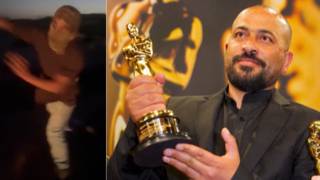
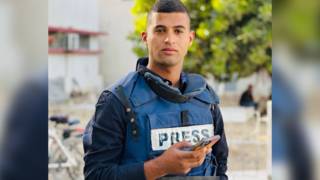
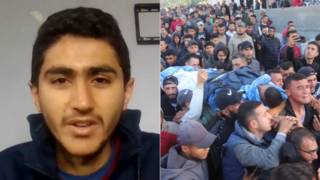
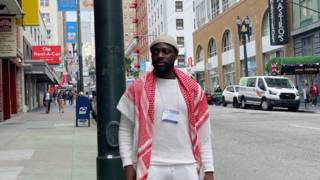





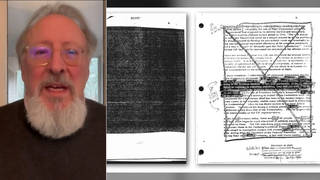
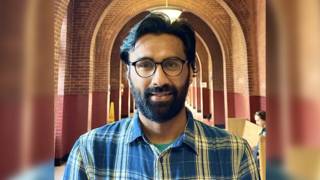
Media Options